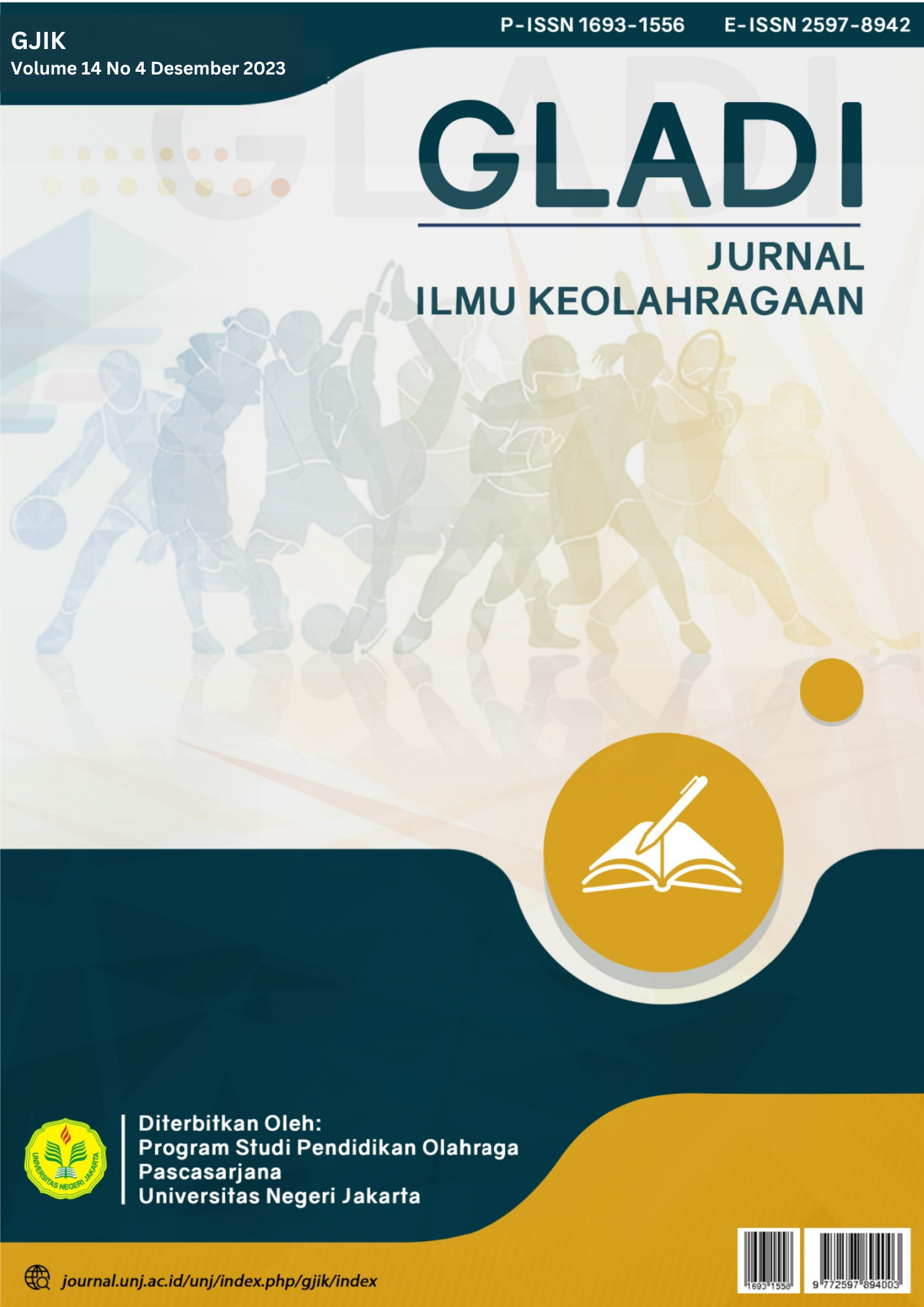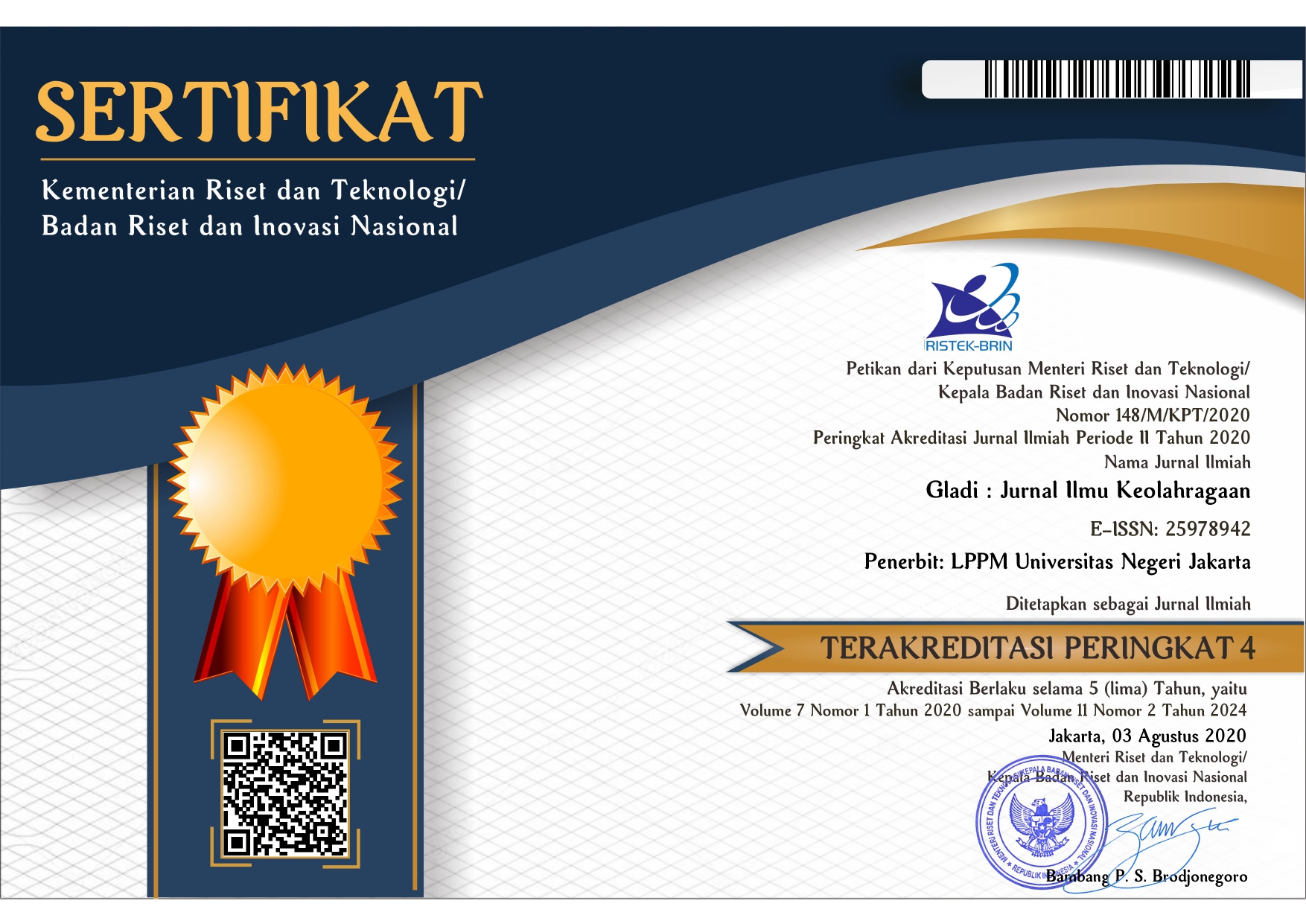DEVELOPMENT OF DEEP FUN GAME TRAINING METHODS FOOTBALL TO IMPROVE QUALITY EARLY CHILDREN PASSING
English
DOI:
https://doi.org/10.21009/GJIK/144.06Keywords:
development, fun game, passing, footballAbstract
Abstract with the title "Development of Fun Game Training Methods in Football to Improve the Quality of Passing for Early Childhood". This study used the Research & Development (R&D) development research method from Borg and Gall. The samples used in this study were 10 participants from the SSB KKM Cidulang. This research and development resulted in a fungame training model to improve the quality of football passing which has been validated, tried out and made improvements. The end product of fungame training consist s of various fungame training models to improve the quality of passing. The results of this research and development are data on pretest posttest scores and questionnaires using SPSS IBM 25 for windows with a significant level of 0.05. The results of this study indicate that the increase in football passing is 5%. From the results of the research that has been done, it can be concluded that the passing training model can be developed and applied in the training process. Apart from that, with the fungame training model to improve the quality of passing that has been developed, evidence is obtained that there is a significant increase shown in the test results of the pretest, posttest and also questionnaire data, there is a difference between before and after the treatment of the fungame training model to improve the quality of passing football. Based on these results, it can be used as a football fungame training model as well as an output product of a fungame training model to improve the quality of football passing.
Downloads
References
Irfan, Muhammad, Ronni Yenes, Roma Irawan, and Irfan Oktavianus. 2020. “Kemampuan Teknik Dasar Sepakbola.” Jurnal Patriot 2(3):720–31.
Irianto, S. 2011. “Standardisasi Kecakapan Bermain Sepakbola Untuk Siswa Sekolah Sepakbola (Ssb) Ku 14-15 Tahun Se-Daerah Istimewa Yogyakarta.” Jurnal Olahraga Prestasi 7(7):44–50.
Izulhaq, Moch Feri, Ade Irma Purnamasari, Arif Rinaldi Dikananda, Kesambi Karyamulya, Kota Cirebon, and Anatomi Tubuh. 2022. “PENGEMBANGAN GAME EDUKASI UNTUK MENINGKATKAN PEMAHAMAN.” (2):246-51.
Mahfud, Imam, Rizki Yuliandra, and Aditya Gumantan. 2020. “Model Latihan Dribling Sepakbola Untuk Pemula Usia Sma.” Sport Science and Education Journal 1(2):1–9. doi: 10.33365/ssej.v1i2.823.
Maksum, Ali. 2012. Metodologi Penelitian. X. Surabaya: Unesa University. Ngolo, Hamid, Mukhlis Nur, and Abdul Gani. 2018. “PENGEMBANGAN MODEL PEMBELAJARAN PASSING PERMAINAN SEPAK BOLA DI SMP NEGERI 7 WASILEI HALMAHERA TIMUR PENDAHULUAN” Pendidikan Jasmani Dan Kesehatan Merupakan Salah Satu Upaya Untuk Mengoptimalkan Kemampuan Belajar . Pengembangan Model Pembelajaran Pendidika.” 30–41.
Rustanto, Heri. 2017. “UPAYA MENINGKATAN KETERAMPILAN PASSING Sangat Besar , Agar Dapat Mengirimkan Bola Dengan Teliti Kepada Seseorang Kawan Sasaran , Letakkan Kaki Tumpu Di Samping Bola , Letakkan Kaki Ayun Menyamping.” Pendidikan Olahraga 6(3):21–32.
Santoso, Singgih. 2002. Buku Latihan SPSS Statistik Multivariat. Jakarta: PT. Elex Media Komputindo.
Sari, G., and F. Marhaendra. 2021. “Pengaruh Latihan Fun Games Terhadap Tingkat Kebosanan Atlet Bolavoli Putra Putri Ekstrakurikuler Sma Kartika Iv-3 Surabaya.” Jurnal Prestasi Olahraga 104–8.
Tua Hutajulu, Pahala. 2013. “Meningkatkan Ketrampilan Teknik Dasar Passing Sepakbola Melalui Pengembangan Model Belajar Permainan Pada Siswa Putra Kelas V Sd.” 1(1):46–51.
Wahyu Hidayat, Setya Rahayu. 2015. “Evaluasi Program Pembinaan Prestasi Sepakbola Klub Persibas Banyumas.” Journal of Sport Sciences and Fitness 4(2):10–15.
Zallaf, Katsran. 2021. “Efektivitas Metode Latihan Fun Games Terhadap Hasil Belajar Teknik Smash Sepak Takraw.” Jurnal Muara Olahraga 3(2):129–38. doi: 10.52060/jmo.v3i2.613.
Amanda, Livia, Ferra Yanuar, and Dodi Devianto. 2019. “Uji Validitas Dan Reliabilitas Tingkat Partisipasi Politik Masyarakat Kota Padang.” Jurnal Matematika UNAND 8(1):179. doi: 10.25077/jmu.8.1.179-188.2019.
Harianto, `Gutomo, Mochamad Nurhadi, Nur Wakit, and Eko Sujarwo. 2016. “Model Pembelajaran Passing Sepak Bola Di Sd.” Briliant: Jurnal Riset Dan Konseptual 1(1):58. doi: 10.28926/briliant.v1i1.8.
Heri Yogo Prayadi. 2013. “Pengaruh Metode Latihan Dan Power Lengan ... Heri Yogo Prayadi, Hari Amirullah Rachman 63.” Keolahragaan 1(1):64–65.
Maksum, Ali. 2012. Metodologi Penelitian. X. Surabaya: Unesa University.
Ridwan, M. 2020. “Kondisi Fisik Pemain Sekolah Sepakbola (SSB) Kota Padang.” Jurnal Performa Olahraga 5(1):65–72. doi: 10.24036/jpo142019.
Sugiyono. 2017. Metode Penelitian Kuantitatif, Kualitatif Dan R&D. 27th ed. Bandung: ALFABETA,CV.
Taufiqurriza, Hendri. 2012. “Tingkat Keterampilan Dasar Permainan Sepak Bola Pada Siswa Sekolah Dasar.” Active - Journal of Physical Education, Sport, Health and Recreation 1(1):1–3.







